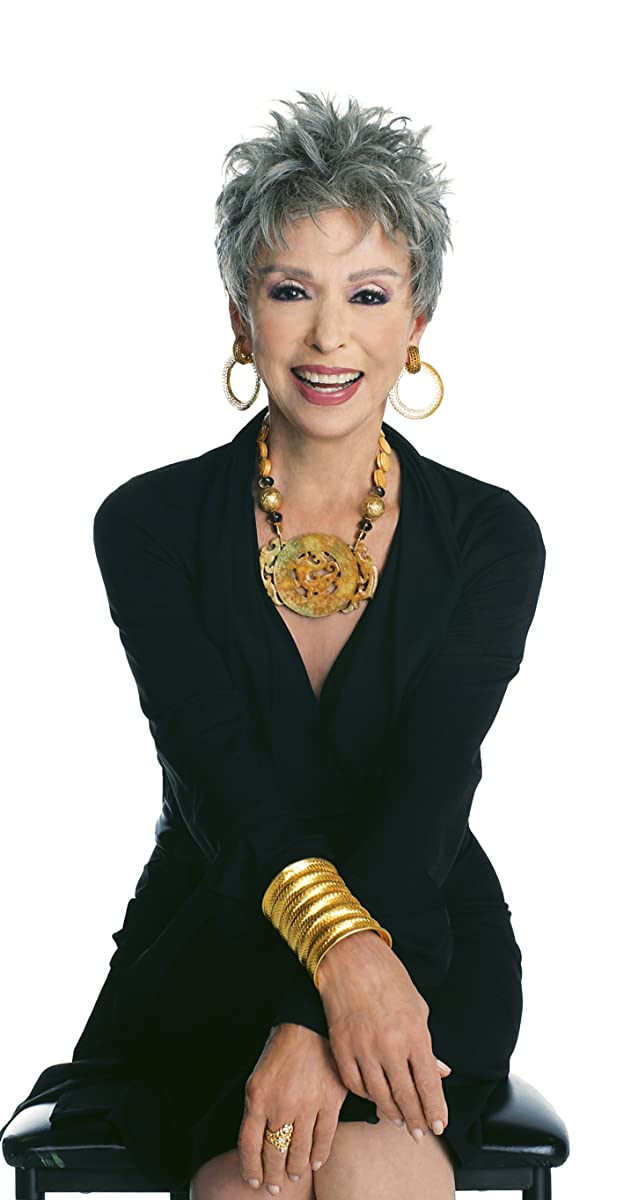
Rita Moreno
Rita Moreno is one of the very few performers to win an Oscar, an Emmy, a Tony and a Grammy, thus becoming an EGOT. She was born Rosita Dolores Alverío in the hospital in Humacao, Puerto Rico on December 11, 1931 (but raised in nearby, smaller Juncos, which had no hospital), to seamstress Rosa María (Marcano) and farmer Francisco José “Paco” Alverío. Her mother moved to New York City in 1937, taking Rita with her while leaving her reportedly unfaithful husband and Rita’s younger brother behind. Rita’s professional career began before she reached adolescence.
From the age of nine, she performed as a professional dancer in New York night clubs. At age 11, she landed her first movie experience, dubbing Spanish-language versions of US films. Less than a month before her 14th birthday on November 22, 1945, she made her Broadway debut in the play “Skydrift” at the Belasco Theatre, costarring with Arthur Keegan and a young Eli Wallach. Although she would not appear again on Broadway for almost two decades, Rita Moreno, as she was billed in the play, had arrived professionally. In 1950, she was signed by MGM, but the studio dropped her option after just one year.
The cover of the March 1, 1954, edition of “Life Magazine” featured a three-quarters, over-the-left-shoulder profile of the young Puerto Rican actress/entertainer with the provocative title “Rita Moreno: An Actresses’ Catalog of Sex and Innocence”. It was sexpot time, a stereotype that would plague her throughout the decade. If not cast as a Hispanic pepper pot, she could rely on being cast as another “exotic”, such as her appearance on Father Knows Best (1954) as an exchange student from India. Because of a dearth of decent material, Moreno had to play roles in movies that she considered degrading. Among the better pictures she appeared in were the classic Singin’ in the Rain (1952) and The King and I (1956).
Director Robert Wise, who was chosen to co-direct West Side Story (1961) (the film version of the smash Broadway musical, a retelling of William Shakespeare’s “Romeo & Juliet” with the warring Venetian clans the Montagues and Capulets re-envisioned as Irish/Polish and Puerto Rican adolescent street gangs, the Jets and the Sharks), cast Moreno as “Anita”, the Puerto Rican girlfriend of Sharks’ leader Bernardo, whose sister Maria is the piece’s Juliet.
However, despite her talent, roles commensurate with that talent were not forthcoming in the 1960s. The following decade would prove kinder, possibly because the beautiful Moreno had aged gracefully and could now be seen by filmmakers, TV producers and casting directors as something other than the spitfire/sexpot that Hispanic women were supposed to conform to. Ironically, it was in two vastly diverging roles–that of a $100 hooker in director Mike Nichols’ brilliant realization of Jules Feiffer’s acerbic look at male sexuality, Carnal Knowledge (1971), and Milly the Helper in the children’s TV show The Electric Company (1971)–that signaled a career renaissance.
Moreno won a 1972 Grammy Award for her contribution to “The Electric Company”‘s soundtrack album, following it up three years later with a Tony Award as Best Featured Actress in a Musical for “The Ritz” (a role she would reprise in the film version, The Ritz (1976)). She then won Emmy Awards for The Muppet Show (1976) and The Rockford Files (1974).
She has continued to work steadily on screen (both large and small) and on stage, solidifying her reputation as a national treasure, a status that was officially ratified with the award of the Presidential Medal of Freedom by President George W. Bush in June 2004.
Rita Moreno Keywords
Rita Moreno Contact Details, Rita Moreno Facebook, Rita Moreno Instagram, Rita Moreno Phone Number, Rita Moreno Cell Phone, Rita Moreno Address, Rita Moreno Whatsapp Number, Rita Moreno Whatsapp Group, Rita Moreno Email, Rita Moreno Phone Number 2020, Rita Moreno Twitter Account